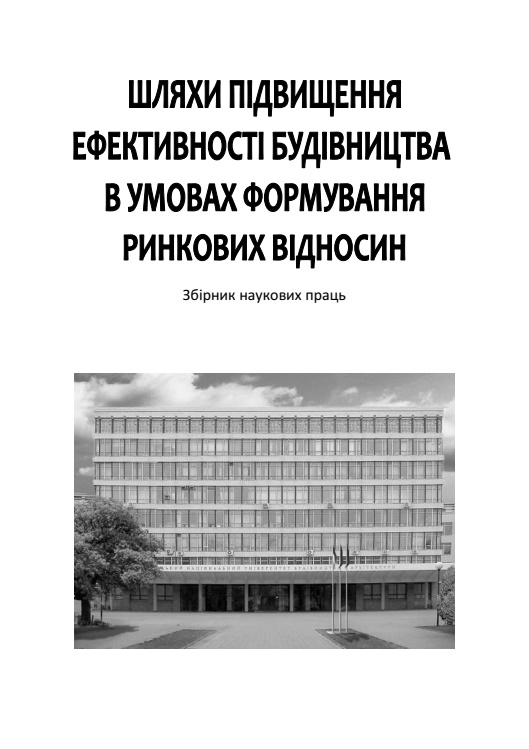Formation of requirements for building objects throughout their full life cycle
DOI:
https://doi.org/10.32347/2707-501x.2019.39.179-186Keywords:
building object, life cycle, quality, energy efficiency, environmental friendliness, costAbstract
The main requirements for building projects during their life cycle – design, construction, maintenance – for the further formation and formalization of determining factors and quantifying their impact on the cost and duration of construction, predicting the best values of technical and economic indicators of projects, taking into account the effective use resources, energy efficiency, environmental safety and values of urban areas.
References
Большаков В.И. Планирование строительства доступного жилья в генеральных планах крупных городов (на примере г. Киева): Монография / В.И. Большаков, Т.С. Кравчуновская, С.П. Броневицкий; под ред. В.И. Большакова. – Днепропетровск: ПГАСА, 2015. – 146 с.
Броневицкий С.П. Методы управления строительным комплексом в Украине / С.П. Броневицкий // Международный научно-исследовательский журнал. – 2015. – № 4 (35), ч. 1. – С. 40-42.
Генералов В.П. Особенности проектирования высотных зданий: учеб. пособие / В.П. Генералов. – Самара: Самарск. гос. арх.-строит. ун-т, 2009. – 296 с.
Генеральний план м. Києва. Основні положення / [Броневицький С., Присяжнюк В., Дьомін М., Целовальник С., Куделін А., Нечаєва Т.]. – К.: КМДА, 2015. – 134 с.
Загальні принципи забезпечення надійності та конструктивної безпеки будівель і споруд: ДБН В.1.2-14:2018 [Електронний ресурс]. – Режим доступу: http://online.budstandart.com/ua/catalog/doc-page.html?id_doc=78683.
Ковальов В.В. Принципи формування множини факторів, які впливають на техніко-економічні показники проектів реконструкції промислових підприємств / В.В. Ковальов // Вісник Придніпровської державної академії будівництва та архітектури. – Дніпро: ПДАБА, 2017. – № 6. – С. 72-77.
Крижановская Н.Я. Принципы гуманизации архитектурно-градостроительной инфраструктуры в крупнейших городах Украины (на примере города Харькова): Монография / Н.Я. Крижановская, М.А. Вотинов. – Харьков: ХНУГХ им. А.Н. Бекетова, 2016. – 186 с.
Обґрунтування вартості будівництва житла з урахуванням чинника інвестиційної привабливості територій / Є.І. Заяць, І.В. Тріфонов, С.П. Броневицький, С.В. Єпіфанцева // Вісник Придніпровської державної академії будівництва та архітектури. – Дніпропетровськ: ПДАБА, 2015. – № 11. – С. 31-37.
Строительство [Электронный ресурс]. – Режим доступа: ais.by/storystroy.
Чернишев Д.О. Науково-методологічний інструментарій організації будівництва на засадах біосферосумісності: дис. … д-ра техн. наук: 05.23.08 / Чернишев Денис Олегович; ДВНЗ «Придніпр. держ. академія буд-ва та архітектури». – Дніпро, 2019. – 430 с.
Lambeck R. Urban construction project management / Richard Lambeck, John Eschemuller. – 1st edition. – New York: McGraw-Hill, 2008. – 480 p.
Sidney V.L. Project management in construction / V. Levy Sidney. – New York: McGraw-Hill, 2006. – 402 p.
Tampoli A.R. Tall and supertall buildings: planning and design / Akbar Tamboli. – New York: McGraw-Hill, 2014. – 416 p.
Yeang K. The skyscraper, bioclimatically considered: a design primer / Ken Yeang. – New York: Wiley-Academy, 1997. – 200 p.
Downloads
How to Cite
Issue
Section
License

This work is licensed under a Creative Commons Attribution 4.0 International License.
Authors who publish with this journal agree to the following terms:
- Authors retain copyright and grant the journal right of first publication with the work simultaneously licensed under a Creative Commons Attribution License that allows others to share the work with an acknowledgement of the work's authorship and initial publication in this journal.
- Authors are able to enter into separate, additional contractual arrangements for the non-exclusive distribution of the journal's published version of the work (e.g., post it to an institutional repository or publish it in a book), with an acknowledgement of its initial publication in this journal.
- Authors are permitted and encouraged to post their work online (e.g., in institutional repositories or on their website) prior to and during the submission process, as it can lead to productive exchanges, as well as earlier and greater citation of published work (See The Effect of Open Access).

